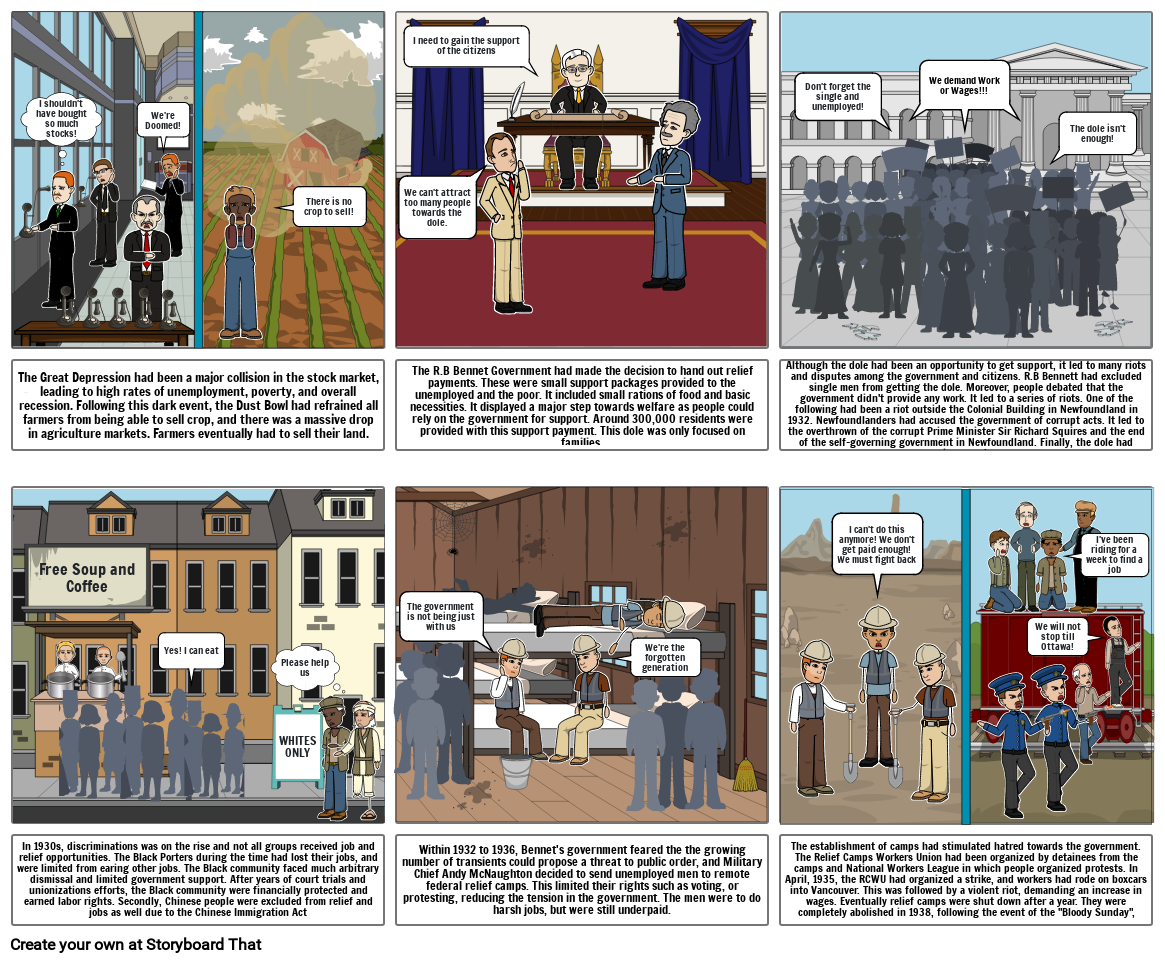Unknown Story

Texte du Storyboard
- I shouldn't have bought so much stocks!
- We're Doomed!
- There is no crop to sell!
- We can't attract too many people towards the dole.
- I need to gain the support of the citizens
- Don't forget the single and unemployed!
- We demand Work or Wages!!!
- The dole isn't enough!
- Free Soup and Coffee
- The Great Depression had been a major collision in the stock market, leading to high rates of unemployment, poverty, and overall recession. Following this dark event, the Dust Bowl had refrained all farmers from being able to sell crop, and there was a massive drop in agriculture markets. Farmers eventually had to sell their land.
- Yes! I can eat
- Please help us
- The R.B Bennet Government had made the decision to hand out relief payments. These were small support packages provided to the unemployed and the poor. It included small rations of food and basic necessities. It displayed a major step towards welfare as people could rely on the government for support. Around 300,000 residents were provided with this support payment. This dole was only focused on families.
- The government is not being just with us
- We're the forgotten generation
- Although the dole had been an opportunity to get support, it led to many riots and disputes among the government and citizens. R.B Bennett had excluded single men from getting the dole. Moreover, people debated that the government didn't provide any work. It led to a series of riots. One of the following had been a riot outside the Colonial Building in Newfoundland in 1932. Newfoundlanders had accused the government of corrupt acts. It led to the overthrown of the corrupt Prime Minister Sir Richard Squires and the end of the self-governing government in Newfoundland. Finally, the dole had increased.
- I can't do this anymore! We don't get paid enough!We must fight back
- I've been riding for a week to find a job
- We will not stop till Ottawa!
- In 1930s, discriminations was on the rise and not all groups received job and relief opportunities. The Black Porters during the time had lost their jobs, and were limited from earing other jobs. The Black community faced much arbitrary dismissal and limited government support. After years of court trials and unionizations efforts, the Black community were financially protected and earned labor rights. Secondly, Chinese people were excluded from relief and jobs as well due to the Chinese Immigration Act
- WHITES ONLY
- Within 1932 to 1936, Bennet's government feared the the growing number of transients could propose a threat to public order, and Military Chief Andy McNaughton decided to send unemployed men to remote federal relief camps. This limited their rights such as voting, or protesting, reducing the tension in the government. The men were to do harsh jobs, but were still underpaid.
- The establishment of camps had stimulated hatred towards the government. The Relief Camps Workers Union had been organized by detainees from the camps and National Workers League in which people organized protests. In April, 1935, the RCWU had organized a strike, and workers had rode on boxcars into Vancouver. This was followed by a violent riot, demanding an increase in wages. Eventually relief camps were shut down after a year. They were completely abolished in 1938, following the event of the Bloody Sunday,
Plus de 30 millions de storyboards créés

